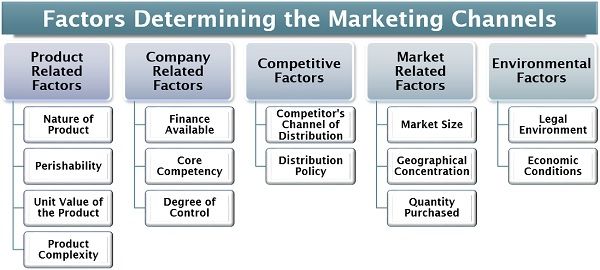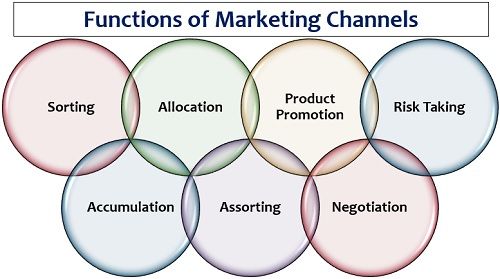Definition: Marketing channel is a system which ensures the distribution of the merchandise from the producer to the consumers by passing it through multiple levels known as middlemen. It is also known as channels of distribution. Every product is different from one another and so are their channels of distribution.
Let us take the example of Mondelez India Foods Limited (Cadbury India Limited).
Cadbury is India’s most popular chocolate brand and we can easily buy it from any of our next-door grocery stores. But do you know how it reaches each and every part of the country, even to the villages?
All this possible because of marketing channels. Cadbury has limited manufacturing units in India. With the help of a well-designed marketing channel, the product reaches the depots located in the various states. From these depots, it is sent to the C&F agents and from there it reaches the distributors located in different cities.
The distributors sell the product to the wholesalers and the retailer who finally makes it available to the customers.
Types of Marketing Channels
- Direct Marketing Channel / Zero-Level Channel
- Indirect Marketing Channels: One-Level Channel; Two-Level Channel; Three-Level Channel
Content: Marketing Channels
- Factors
- Product-Related Factors
- Company Related Factors
- Competitive Factors
- Market-Related Factors
- Environmental Factors
- Functions
- Conclusion
Factors Determining the Marketing Channels
There are certain factors related to the product, the company, the competitors, the market and the environment which determines the selection of an appropriate channel of distribution for a particular product.
To know about these factors in detail, let us go through the following categories:

Product-Related Factors
The product’s features, specifications, nature, usage, value and durability plays a vital role in the selection of marketing channels. Let us go through the related factors give below:
- Nature of Product: If the product is a general product which is widely used like cosmetics, it requires a more extended channel. Whereas, the product which is customised or has limited customers like industrial machinery needs a shorter channel.
- Perishability: The goods which are perishable require to be sold through the shorter channel. However, the products which are non-perishable can be distributed through a longer channel.
- Unit Value of the Product: If the product is of low value it can be easily distributed through the longer channel, but for the products which are expensive and valuable the manufacturers prefer a shorter channel.
- Product Complexity: If the product is complicated to use and has technical specifications, it will require a shorter channel. The products which are user-friendly and easy to handle can be sold through longer channels.
Company Related Factors
The company’s financial condition, objectives, privacy policies and level of control influences the selection of a particular marketing channel:
- Finance Available: If a company is financially sound it can go for a shorter channel of distribution by opening its retail outlets otherwise it can opt for a longer marketing channel.
- Core Competency: If the manufacturing company focus on its core ability which is the production of goods it will be least interested in retailing. Thus it can opt for a longer marketing channel.
- The degree of Control: If the company wants to regulate its sale and the market segment it caters, it will prefer a shorter channel. The companies which do not exercise much control over its products go for a longer distribution channel.
Competitive Factors
The competitors affect the company’s decisions related to the selection of marketing channels in the following ways:
- Competitor’s Channel of Distribution: Sometimes the companies follow their competitors and use the same channel as adopted by them.
- Distribution Policy: Some companies have a different distribution policy, and they adhere to it. Multi-level marketing (MLM) companies usually stick to their chain marketing policy.
Market-Related Factors
The market is the place where the customers are served. Thus, it has a crucial role in determining the type of channel for any product. Let us see these factors in detail:
- Market Size: When the company needs to reach a large number of customers, it has to go for the longer channel. If the company has to cater a few customers, it can opt for a shorter channel of distribution.
- Geographical Concentration: If the potential customers are located in a vast geographic area, the company can reach them through a longer channel. The shorter channel will be preferred for the buyers located in the limited area.
- Quantity Purchased: If the product is purchased in bulk quantity by the limited customers, a shorter channel is suitable whereas the products which are bought in small quantities by multiple customers, a longer channel will work.
Environmental Factors
Every business operates within an environment where it has to deal with some legal obligations as well as economic conditions. These factors include the following:
- Legal Environment: The government imposes certain legal restrictions over trading activities which also affects the selection of a distribution channel. Like selling of weapons cannot take place through a longer channel.
- Economic Conditions: At the time of recession or depression in a country, the manufacturers prefer to reduce their distribution cost by going for a shorter marketing channel.
Functions of Marketing Channels
Marketing channels initially aim at the availability of products or services to prospective customers. This channel is selected by the factors mentioned above.
Intermediaries are the people or organisations which acts as a link between the manufacturers and the customers. They perform multiple functions to facilitate both, the companies as well as the customers.
These functions are explained in detail below:

- Sorting: The middlemen purchase goods from multiple manufacturers and segregate the products which are similar in quality, features, size, etc.
- Accumulation: Marketing channels ensure regular supply and circulation of goods in the market since the middlemen involved in the process are responsible for maintaining the required stock in ample quantity.
- Allocation: The goods are manufactured in bulk quantities whereas the customers prefer to buy very less quantity. Here comes the role of the middlemen who breaks the volume into small packages according to the customers’ requirement.
- Assorting: The customers can avail a large variety of products since the middlemen buy goods from the manufacturers or suppliers located in different regions and make them available to the customers at one single place.
- Product Promotion: The middlemen involved in the channel of distribution sometimes directly or indirectly promotes the sale of a particular product through a special display, loyalty programmes, additional discounts, organising sale, etc.
- Negotiation: The middlemen is the person who bargains with the manufacturer as well as the consumer for the product’s price, proportion, quality, after-sale service, guarantee, etc.
- Risk-Taking: The middlemen, i.e. the wholesalers and the retailers have to bear the risk related to products like expiry, breakage, spoilage, damage, etc. These risks are even born at the time of transportation and warehousing.
Conclusion
Marketing channels ensure mobility of goods or services from the manufacturing units to the area of its consumption. Without the proper distribution of merchandise, the manufacturer won’t realize the desired value of his production.
Leave a Reply